Archive for December 30th, 2010
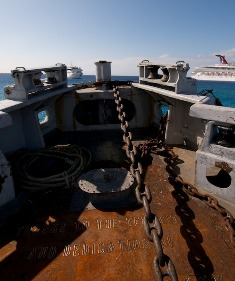
Officials cross fingers for sinking of Kittiwake
 (CNS): Weather permitting and all things being equal, the sinking of the ex-USS Kittiwake is finally expected to take place on Tuesday morning at 10:00am. The de-commissioned naval/submarine vessel that is being sunk to create a new dive attraction in Grand Cayman is currently docked at the George Town Port, where it is being prepped for sinking, officials confirmed Thursday. The 251-foot, 2,200 ton, five-deck military vessel, which served the United States Maritime Administration (US MARAD) for over 50 years after it was commissioned in 1945, arrived in Grand Cayman on Christmas Day after a 10-day towing period from the James River Reserve Fleet in Virginia, USA. (Photo from Kittiwake website)
(CNS): Weather permitting and all things being equal, the sinking of the ex-USS Kittiwake is finally expected to take place on Tuesday morning at 10:00am. The de-commissioned naval/submarine vessel that is being sunk to create a new dive attraction in Grand Cayman is currently docked at the George Town Port, where it is being prepped for sinking, officials confirmed Thursday. The 251-foot, 2,200 ton, five-deck military vessel, which served the United States Maritime Administration (US MARAD) for over 50 years after it was commissioned in 1945, arrived in Grand Cayman on Christmas Day after a 10-day towing period from the James River Reserve Fleet in Virginia, USA. (Photo from Kittiwake website)
A project of the Ministry and Department of Tourism in partnership with the Cayman Islands Tourism Association (CITA), the idea for acquiring the Kittiwake to create a new dive attraction for the Cayman Islands had its genesis some seven years ago. The Cayman Islands’ acquisition of the decommissioned naval vessel marks the first time that a US MARAD ship has been donated to a foreign government for the creation of an artificial reef to preserve the marine environment.
Premier McKeeva Bush described the sinking as the single most significant occurrence in a decade for Cayman’s dive industry. “Our tourism stakeholders in both the public and private sectors are naturally very excited about it,” he said. “Since the last year, the Ministry and Department of Tourism, CITA and Kittiwake Project Manager, Nancy Easterbrook, have been working hand in hand through many processes to ensure the cleaning and safe movement of the vessel to the Cayman Islands in preparation for its sinking and I am pleased to see that we are almost at the finish line.”
The Kittiwake will be sunk on the north end of Seven Mile Beach and joins the MV Captain Keith Tibbetts, a Russian Frigate sunk off the coast of Cayman Brac in 1996, as central dive sites in the artificial reef movement in the Cayman Islands and the Caribbean.
On Monday lunchtime 3 January there will be a brief dedication ceremony and unveiling of a commemorative plaque. Tenders for the general public to circle the Kittiwake will be operating every 30 minutes between 2 and 4pm. The sinking event will take place off West Bay Public Beach at 10:00am on Tuesday 4 January.
For more information and to follow the developments of the Kittiwake visit www.kittiwakecayman.com
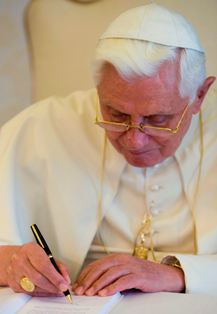
Pope signs financial transparency laws for Vatican
 (Reuters): The Vatican, whose bank is the focus of a money laundering investigation has enacted laws that it says will bring it in line with international standards on financial transparency and the fight against funding terrorism. It was the biggest action ever taken by the Vatican to meet demands for more financial openness. It establishes an internal watchdog, known as a Financial Information Authority (FIA), to check compliance with international financial law. Pope Benedict signed a "Motu Proprio," a form of executive order, in which the Vatican establishes a set of internal laws promising its bank and all other departments will adhere to regulations and cooperate with foreign authorities.
(Reuters): The Vatican, whose bank is the focus of a money laundering investigation has enacted laws that it says will bring it in line with international standards on financial transparency and the fight against funding terrorism. It was the biggest action ever taken by the Vatican to meet demands for more financial openness. It establishes an internal watchdog, known as a Financial Information Authority (FIA), to check compliance with international financial law. Pope Benedict signed a "Motu Proprio," a form of executive order, in which the Vatican establishes a set of internal laws promising its bank and all other departments will adhere to regulations and cooperate with foreign authorities.
"The Vatican now is totally inserted into this system in solidarity with the international community and with international authorities," spokesman Father Federico Lombardi said.
The new laws aim to make the Vatican City, a 108-acre sovereign state surrounded by Rome, comply with the rules of the Financial Action Task Force (FATF), a Paris-based body that lists states failing to comply with standards on money laundering and terrorism financing.
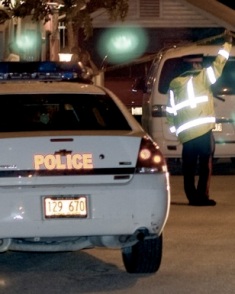
This is the year that was …
 (CNS): As the worldwide recession took a grip in Cayman during 2010, a surge of armed robberies and home invasions, along with some of the worst gang shootings ever seen, ensured that crime dominated the local news headlines. As the year began the RCIPS was already immersed in a murder investigation after the shooting of Fabian Powell on 28 December 2009, a crime for which no one has been arrested a year after the discovery his body outside Welly’s Cool Spot. Although the police did manage to bring charges in several killings, the murder toll continued to mount in 2010, including the most shocking of all, in which a four-year-old boy was shot dead at a West Bay gas station. (Photos by Dennie Warren Jr)
(CNS): As the worldwide recession took a grip in Cayman during 2010, a surge of armed robberies and home invasions, along with some of the worst gang shootings ever seen, ensured that crime dominated the local news headlines. As the year began the RCIPS was already immersed in a murder investigation after the shooting of Fabian Powell on 28 December 2009, a crime for which no one has been arrested a year after the discovery his body outside Welly’s Cool Spot. Although the police did manage to bring charges in several killings, the murder toll continued to mount in 2010, including the most shocking of all, in which a four-year-old boy was shot dead at a West Bay gas station. (Photos by Dennie Warren Jr)
Police faced the ire of the community throughout the year as armed robberies reached record highs. Home invasions also began to shake up the community and saw one licensed firearm holder shoot an intruder dead in July.
Some of Cayman’s most notorious gang members were arrested and charged in 2010 over various shootings and killings. Raziel Jeffers is now facing three separate murder charges for the deaths of Marcus Ebanks, who was shot by two masked gun men in 2009, Damian Ming, who was killed in his own yard on the eve of his return to prison on drug charges, and Marcos Gauman, who was gunned down in Maliwinas Way. A 16-year-old boy, who sustained a serious gunshot injury to his leg on the same night as the killing, has also been charged with the murder of Gauman.
Devon Anglin was arrested and charged with a shooting which stunned the community. Four-year-old Jeremiah Barnes was shot in the head as he sat in a car with his family on the forecourt of the Hell Esso gas station in West Bay in February. Anglin is expected to face trial sometime in 2011.
Andy Barnes, the father of Jeremiah and a witness in the case against Anglin, spent this Christmas in jail with both Anglin and Justin Manderson, who is charged with the attempted murder of Barnes outside Kelly’s Bar, West Bay, in June. Barnes, who was charged with possession of an unlicensed firearm with intent, was remanded to Northward Prison on Christmas Eve in connection with a dispute in Bodden Town on Friday, 17 December.
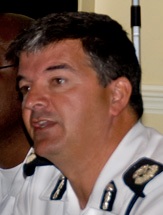 The year was also marked with weekly armed robberies of gas stations and liquor stores, as well as a number of daylight bank robberies. Police did make a number of arrests with regards outstanding gang killings but they failed to make a mark on many of the serious violent robberies, including the bank heists.
The year was also marked with weekly armed robberies of gas stations and liquor stores, as well as a number of daylight bank robberies. Police did make a number of arrests with regards outstanding gang killings but they failed to make a mark on many of the serious violent robberies, including the bank heists.
Politicians also had a tough year. With no magic bullet to cure the country’s economic ills, they were criticised for unnecessary spending on travel and the trappings of office while civil servants faced a 3.2% salary cut. Increases in fees and duty bit hard and unemployment continued to grow among Caymanians. With a declining population as a result of the contraction of the economy, local businesses battled with increased overheadsand declining takings, as well as the rise in crime.
January:
The year began with several break-ins and burglaries, along with an increase on duty rates. On Monday, 4 January, as the shops reopened after the holidays, customers were faced with a duty increase of two percentage points, which meant a real price increase of around 10 percent in the shops. Goods charged at 20% went to 22% and those at 25% to 27% duty levy.
The first tragedy of 2010 came when police launched a search and rescue operation on 10 January. Five people who left to go fishing that morning never returned and police called off the search after several days of looking for Raynell Wood, Astor Range, Joshua Gilman, Jeamie Avila and Michelle Wood.
Caymanians were also shaken – literally – by an earthquake registering 5.9 magnitude on the Richter scale. The quake came only days after a massive earthquake in Haiti. Fortunately, Grand Cayman escaped unscathed with the exception of a few curious sink holes.
Meanwhile, in the courtroom the crown scored its first notable success of the year with a murder conviction against Randy Martin for the murder of 21-year-old Sabrina Schirn. Martin, who killed Schirn in a machete attack during a clandestine meeting at the prison farm, was sentenced to life in prison on the 26 January after a judge-alone trial.
The first murder of the year occurred on Thursday, 28 January, following the discovery of the body of 32-year-old Courtney Spence in the car park of the Progressive warehouse in Sparky Drive, industrial area, George Town. The police described the shooting of Spence as he left his workplace that night as a “premeditated attack” but have yet to bring any charges in the case.
The country welcomed the arrival of the new governor, Duncan Taylor, who after the departure of his predecessor, Stuart Jack, perhaps the most unpopular governor the territory has ever seen, remained remarkably quiet throughout 2010.
February:
One of the biggest murder trials ever witnessed in Cayman opened on Monday, 1 February, when Larry Ricketts and Kirkland Henry appeared in the dock to face trial for the abduction, rape, robbery and murder of Estella Scott-Roberts. The trial, which was presided over by the chief justice, lasted three weeks and ended in a guilty verdict.
On 4 February the police were tackling their first bank robbery of the year when the Cayman National, Savannah branch, was robbed by two masked gunmen around lunch time. Police have yet to bring any charges in the case.
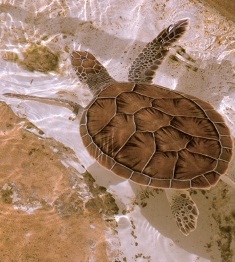 What some described as a “daylight robbery” of another kind took place in February at the country’s Turtle Farm. As Tim Adam took up his new post as MD of the beleaguered Boatswain Beach, his first decision was to triple the price of turtle meat in order, he said, to give the farm a fighting chance of sustaining a meat supply into the future.
What some described as a “daylight robbery” of another kind took place in February at the country’s Turtle Farm. As Tim Adam took up his new post as MD of the beleaguered Boatswain Beach, his first decision was to triple the price of turtle meat in order, he said, to give the farm a fighting chance of sustaining a meat supply into the future.
Premier McKeeva Bush chose to announce one of his first major changes to the immigration laws with the introduction of a million dollar residency certificate. Accused of selling status to the highest bidder, Bush said he was trying to find ways to attract investors and boost the local economy as he continued to berate the opposition for leaving the country in debt.
Twenty-two-year-old Dow Travers made history for Cayman when he became the first Caymanian to enter a Winter Olympics, competing in the men’s Giant Slalom in Whistler. Travers made a respectable showing, moving from his start position of 101st to 69th in the rankings with a time of 3:02.89
Any pride Cayman was feeling, however, was rocked when four-year-old Jeremiah Barnes was shot and killed at a West Bay gas station. The child was shot by two armed gunmen and became the innocent victim that police had warned would be a result of the escalating tit-for-tat gang violence on the island.
March:
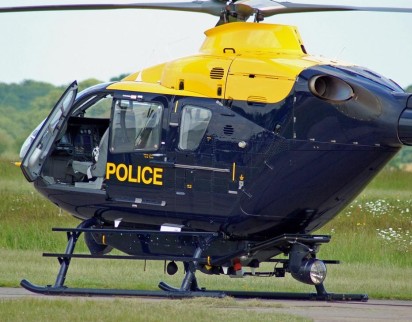 After several years of controversy, the police helicopter finally touched down in Cayman on 4 March. Heralded as a much needed asset in the fight against drugs and gun smuggling, as well as to assist in tracking offenders and rescues, the machine is costing the public purse over $1milllion per annum to operate.
After several years of controversy, the police helicopter finally touched down in Cayman on 4 March. Heralded as a much needed asset in the fight against drugs and gun smuggling, as well as to assist in tracking offenders and rescues, the machine is costing the public purse over $1milllion per annum to operate.
Cayman saw its first ever kidnapping and ransom for cash on 18 March. Four men were eventually arrested and charged with the abduction of a young adult, whom they held hostage in North Side for around 36 hours before he made his escape. The kidnappers had threatened to kill the young man unless his parents paid a ransom of hundreds of thousands of dollars. Three men are expected to face trial in the New Year and one man has pleaded guilty to the offence.
Robberies of fast food restaurants, gas stations and liquor stores mounted as police struggled to cope with what became the country’s worst ever surge in crime.
Shootings in Cayman’s gang wars escalated throughout March and ultimately accumulated in three murders during the course of the month. Marco Gauman, Damion Ming and Alrick Peddie were all shot and killed in the district of West Bay. Several other victims also received gunshot wounds, including a woman who was shot in the face in a George Town bar. Police have since brought charges in all three murders, and trials are expected throughout 2011.
Meanwhile, the political war continued when the premier left for London to gain approval for the country’s budget and more borrowing. The opposition called on government not to cut civil service pay or sell the new government accommodation building. In the face of threats of marches and civil disturbance, the government pulled back on the idea to use the building as a means to raise cash.
April:
Chantelle Morrison got April off to a positive start for the Cayman Islands when she took a gold medal at the CARIFTA games for the under 17’s 100-meter women’s final.
Meanwhile, in sharp contrast, a World Health Organisation report revealed that Cayman’s teens were some of the laziest in the world. In a study of more than 70,000 young teens from 34 countries, teenagers from the Cayman Islands and St. Lucia were found to be the least active kids.
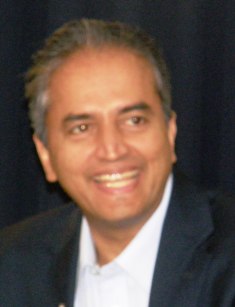 Government signed a deal with the world famous cardiac surgeon, Dr Devi Shetty, as the first step towards the development of a major medical complex on Grand Cayman. Shetty is proposing to invest billions of dollars over the next decade to create a state-of-the-art health city and medical university, set to revolutionize the provisions of tertiary healthcare. Since the deal was signed Shetty has still not announced where the hospital will be and there is no sign of a ground breaking date.
Government signed a deal with the world famous cardiac surgeon, Dr Devi Shetty, as the first step towards the development of a major medical complex on Grand Cayman. Shetty is proposing to invest billions of dollars over the next decade to create a state-of-the-art health city and medical university, set to revolutionize the provisions of tertiary healthcare. Since the deal was signed Shetty has still not announced where the hospital will be and there is no sign of a ground breaking date.
Government also signed an MOU with DECCO (Dart’s construction company) in April to build the George Town cruise port, an understanding which eventually failed to come to fruition. Government admitted in early in December that it was unable to reach agreement with DECCO and had given its second choice developer, GLF Group/Royal Construction, a chance at making the cruise berthing facilities a reality.
The Electoral Boundary Commission completed its work on recommendations for the future political landscape of Cayman. Despite the completion of the report, however, government has made no move since the publication of the report to debate how the country’s legislature will grow.
As government yo-yoed over announcements regarding the possible introduction of VAT or payroll taxes and delayed the budget announcement, the opposition accused the UDP of wasting its first year in office.
April saw the country wave goodbye to the controversial but much admired auditor general, Dan Duguay, who had exposed a number of shortcomings in the government’s handling of public money, not least its failure to publish any financial accounts for more than half a decade. Called a “cowboy” by the premier and having clashed with government, the opposition, the independent member, and even the Governor’s Office over his commitment to transparency, no one was surprised when Duguay’s contract was not renewed and he was given the boot.
May:
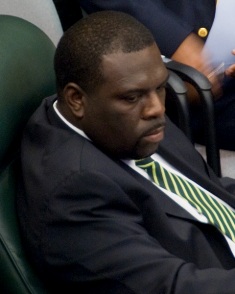 As government reached the anniversary of its first year in office, May brought plenty of turmoil for the UDP. While the government waited for a Conservative victory in the UK, which didn’t quite happen, hoping it would not be forced to introduce tax in exchange for more borrowing, one of its backbenchers was arrested after an altercation outside a Seven Mile Beach hotel. Dwayne Seymour has since been charged with assault and attempting to pervert the court of justice and is next due in court in January. The premier also found himself in the political hot seat when he reneged on the announced intention to cut MLA salaries by 20 percent.
As government reached the anniversary of its first year in office, May brought plenty of turmoil for the UDP. While the government waited for a Conservative victory in the UK, which didn’t quite happen, hoping it would not be forced to introduce tax in exchange for more borrowing, one of its backbenchers was arrested after an altercation outside a Seven Mile Beach hotel. Dwayne Seymour has since been charged with assault and attempting to pervert the court of justice and is next due in court in January. The premier also found himself in the political hot seat when he reneged on the announced intention to cut MLA salaries by 20 percent.
Armed robberies continued as the police launched a month long gun amnesty in the face of violent crime. During the window of opportunity to give up weapons, officials collected 26 guns, a crossbow, tear gas, a Taser, a grenade and more than 200 rounds of ammunition. However, more than nine crimes involving guns were committed during the amnesty.
Elton John’s Roller, Idi Amin’s Merc and the famous Batmobile from the original TV series all found a new home in West Bay as key exhibits at the new Cayman Motor Museum opened by local millionaire Andreas Ugland.
The information commissioner issued warnings that the country’s civil servants were merely paying lip service to the Freedom of Information Law. Jennifer Dilbert said the public was being misinformed by officials, who were not following the proper procedures. Requests for people’s identity, incidents of intimidation and unfounded refusals had all been reported to her office, she revealed. The premier also launched a very public attack on CNS over its requests for information via the law.
The environment also faced a hard time with no sign of the National Conservation Law and continuing threats to wildlife. As the Cayman Islands National Trust launched a campaign for the law, Grand Cayman lost a significant stretch of natural habitat from the North Sound coastline. After being granted planning permission by the CPA in February, the developer of Dragon Bay, Michael Ryan, ripped up over 378,000 square feet of mangrove buffer zone, despite the fact that the Development and Planning Regulations state that such natural protective barriers should only be removed in exceptional circumstances.
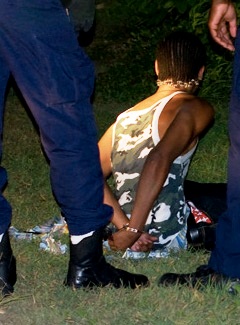 June:
June:
Violent crime continued to increase throughout June, especially armed robberies of gas station and fast food joints. The public was outraged when three teens armed with machetes robbed a pizza shop in Savannah. The troubled teenagers were all apprehended soon after and later pleaded guilty to their crimes. But worse was to come: agunman opened fire on police following a high speed car chase after an armed robbery at Mostyns Gas station in Bodden Town on 16 June. Two men were arrested in the wake of the incideent but only one teenager has been charged in relation to the robbery. His trial started in December but was adjourned before Christmas and is expected to resume in January.
Following meetings with the FCO and the UK’s new overseas territories minister, the Cayman Islands premier got the OK for a further $155million in borrowing and was able to bring his 2010/11 budget, which included a 25 cent hike on fuel duty, to the Legislative Assembly for approval. Despite the opposition ‘no’ vote, the government majority carried the day.
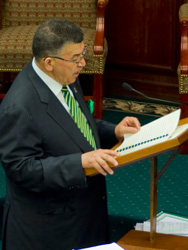 With the annual spending plans brought very late, the budget debate and ensuing Finance Committee, chaired for the first time by the premier, was wrapped up in record time. A process which normally spans across a two week period was ‘done and dusted’ in one nine hour sitting and a second eleven hour sitting, as the premier kept his promise to “do things differently”.
With the annual spending plans brought very late, the budget debate and ensuing Finance Committee, chaired for the first time by the premier, was wrapped up in record time. A process which normally spans across a two week period was ‘done and dusted’ in one nine hour sitting and a second eleven hour sitting, as the premier kept his promise to “do things differently”.
News of Joe Imparato’s proposal to government to build a commercial shipping port in East End was met by opposition from the local PPM MLA and residents of the district. Arden McLean said the developer was using the proposal as an excuse to quarry the land. This was the beginning of a campaign against the East End Seaport, which is expected to step into full gear early January, when a petition against the potential development will go island wide.
The results of an FOI request in June revealed that, despite the economic crunch, the people were footing the bill for the new trappings of office for the premier. The request by a CNS reader to the Cabinet Office revealed that utility bills, Christmas lights, phone, fax, electricity and water bills, security and domestic staff at the premier’s home in West Bay were being paid for from the public purse.
July:
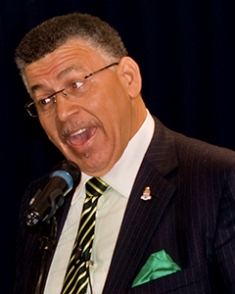 July opened with politics taking centre stage as the opposition criticised the way government was doing business and its efforts to close down debate in the LA. The PPM accused government of attacking the democratic process. Meanwhile, the premier turned his attention back to the media, accusing it of hostility, bias, sarcasm and of twisting government’s message.
July opened with politics taking centre stage as the opposition criticised the way government was doing business and its efforts to close down debate in the LA. The PPM accused government of attacking the democratic process. Meanwhile, the premier turned his attention back to the media, accusing it of hostility, bias, sarcasm and of twisting government’s message.
In the business community the country’s oldest insurance company was forced into liquidation as a result of its parent company’s troubles in Trinidad, and Hadsphaltic, one of the countries oldest developers, also closed its doors due to troubles with its parent company. The controversial and troubled publisher of Cayman Net News, Desmond Seales, died after a sudden heart attack, leaving the country’s second newspaper in turmoil.
Government amended planning laws to facilitate ten storey buildings and the country’s hedge fund sector took a turn for the better. However its decision to go ahead with a $9million hurricane shelter on Cayman Brac stole the headlines.
The green iguana’s free ride ended as government removed the inadvertent protection offered under the law. The National Conservation Law went on the road – again – and the planned sinking of the US Kittiwake was cancelled at the eleventh hour. While the former US naval ship finally arrived in Cayman waters on Christmas morning, there is still no sign of the conservation law.
Meanwhile, with no let up from the country’s criminal element, robbers used a van to crash into a local store in George Town and steal cash. The community was divided, however, when a 65-year-old homeowner used his licensed gun to defend himself against a home intruder in the middle of the night. Harryton Rivers was shot and killed when he broke into a home in Liguinea Circle, George Town. It was later revealed that Rivers was on bail with an electronic security tag, which he had managed to remove before he set out to burgle the George Town Home.
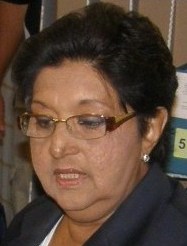 The month ended with an announcement by the UK Privy Council that the Cayman Islands Grand Court Judge, Justice Priya Levers, had misbehaved and that she should be removed from the bench. The judicial committee’s judgment said there were fatal flaws in a judicial career that had many admirable features. Levers had faced a tribunal in May 2009, which had recommended her removal as a result of a number of complaints against her concerning comments made in and out of court.
The month ended with an announcement by the UK Privy Council that the Cayman Islands Grand Court Judge, Justice Priya Levers, had misbehaved and that she should be removed from the bench. The judicial committee’s judgment said there were fatal flaws in a judicial career that had many admirable features. Levers had faced a tribunal in May 2009, which had recommended her removal as a result of a number of complaints against her concerning comments made in and out of court.
August:
The eighth month of the year started with yet another tragedy when twenty-four-year-old FederAnn Faustino was killed by a drunk driver on the Esterley Tibbetts Highway early in the morning of 3 August. Eighteen-year-old Brooke Novak was arrested that night and was later charged and jailed for fifteen months for causing death while driving under the influence of alcohol.
Meanwhile, the RCIPS admitted to running down a cyclist on North Church Street. Despite denials to CNS days after the incident by an RCIPS spokesperson at George Town Police Station, the police eventually confirmed that an RCIPS marked car hit a cyclist in downtown George Town on 1 August and an officer was suspended from driving police vehicles. Following comments about the levels of literacy among RCIPS officers, Police Commissioner David Baines was criticised publicly by the Police Association, further straining relations in the service between the top brass and the rank and file.
White collar crime hit the local headlines when Robert Christopher Girvan pleaded guilty to 18 counts of theft and three counts of money laundering, which the crown said amounted to around $19 million. Girvan was a trader and fund director with four Cayman Islands Hedge Funds, known as the Grand Island Funds, which collapsed in 2008 as a result of major losses related to Girvan’s unauthorised trading. Girvan was eventually given an eight year sentence for his crime.
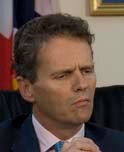 The premier’s request for a sixth elected minister to sit in Cabinet before the LA is expanded at the next election was greeted with silence by the governor, who remained largely silent on most things throughout what was essentially a tumultuous year. Aside from occasional comments to the press regarding the new National Security Council and the need to reduce civil service costs, the UKs representative has remained surprisingly quiet during his first year in office.
The premier’s request for a sixth elected minister to sit in Cabinet before the LA is expanded at the next election was greeted with silence by the governor, who remained largely silent on most things throughout what was essentially a tumultuous year. Aside from occasional comments to the press regarding the new National Security Council and the need to reduce civil service costs, the UKs representative has remained surprisingly quiet during his first year in office.
Questions over MLAs double dipping (taking salaries and a pension from the public purse) were raised by MLA Ezzard Miller. While two PPM members admitted to drawing both, CNS is now taking an FOI request to a hearing in the New Year in order to get information released on all MLAs who are drawing a pension.
Despite being the month normally considered a slow time for politics, former and existing politicians continued to dominate the headlines, with the education minster ‘nodding off’ at the wheel and crashing into boulders in the early hours of the morning in West Bay and the former PPM tourism minister resigning from the opposition party.
In the courts, the crown suffered a major blow when the murder conviction of William McLaughlin-Martinez for the murder of Brian Rankine Carter was quashed by the Court of Appeal and remitted back to the Grand Court for retrial. Martinez is currently servinga mandatory life sentence and is expected to face a new trial early in the New Year.
September:
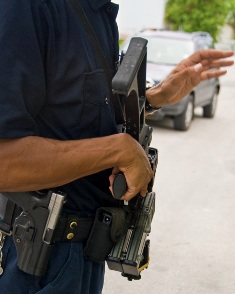 A tourist was the first victims of crime in September when he was mugged on West Bay Road. Immigration made several arrests after its amnesty for over-stayers closed, and it was revealed that RCIPS officers had been taking lie detector tests. The country’s sixth murder occurred in West Bay on the 8 September, when 20-year-old Tyrone Burrell was shot dead in a yard in Birch Tree Hill. Police said they believe that Burrell had information about another killing but had chosen not to come forward. Leonard Ebanks has since been charged with the murder. Robberies also continued, including another daylight bank robbery, this time at Fidelity in downtown George Town. Police have not yet brought charges in connection with the crime.
A tourist was the first victims of crime in September when he was mugged on West Bay Road. Immigration made several arrests after its amnesty for over-stayers closed, and it was revealed that RCIPS officers had been taking lie detector tests. The country’s sixth murder occurred in West Bay on the 8 September, when 20-year-old Tyrone Burrell was shot dead in a yard in Birch Tree Hill. Police said they believe that Burrell had information about another killing but had chosen not to come forward. Leonard Ebanks has since been charged with the murder. Robberies also continued, including another daylight bank robbery, this time at Fidelity in downtown George Town. Police have not yet brought charges in connection with the crime.
Meanwhile, in the courts Patrick McField, Osbourne Douglas and Brandon Leslie-Ebanks were all found guilty of the murder of Omar Samuels in McField Lane, George Town on 5 July 2009.
Still battling for a turnaround in the country’s economic fortunes, the premier declared a need to increase the local population and spoke about cutting the rollover gap. He also turned his attention to the Far East as he courted Asian investors. At home, McKeeva Bush took aim at government bureaucracy and criticised what he called the “silent, passive non-compliance” and a “dragging of feet” over government projects. Implying that it was within the government mechanism that things were being held up, he said bureaucracy was what was preventing him from getting things done. He also told the country that in three months time the local economy would be on the road to recovery, triggering a 90 day count down.
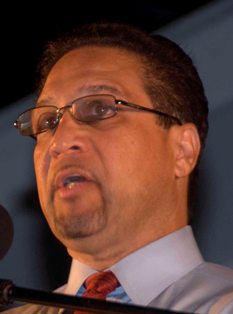 The opposition warned of the erosion of civil liberties as laws came before the Legislative Assembly that appeared to be designed to strengthen the hand of the prosecution and undermined the rights of the people in the court room.
The opposition warned of the erosion of civil liberties as laws came before the Legislative Assembly that appeared to be designed to strengthen the hand of the prosecution and undermined the rights of the people in the court room.
The public was outraged when it was revealed in the Legislative Assembly that the developer of the Ritz Carlton was behind on his payments to the public purse for deferred duty. Owing $6 milllion to the public purse, Michael Ryan had asked for an extension because of the economic difficulties.
A report by the complaints commissioner revealed the full extent of the failure of employers to follow the pension law. In a special report, Nicola Williams said the National Pensions Office (NPO) had systematically failed to enforce the law and bring justice to hundreds of people whose employers have literally stolen their contributions. Although the minister with responsibility has promised an overhaul of the pension and labour laws, the legislation has not yet been brought to parliament.
FOI came under the spotlight again when the information commissioner published a report in “Right to Know Week” revealing widespread problems in compliance with the Freedom of information Law.
October:
A brutal killing marked the beginning of October when Jack Forbes was beaten to death in the evening of 1 October at a shopping plaza in Bodden Town. Having served a ten year prison sentence himself for manslaughter for the killing of Steve Watler in 2000, Forbes had been recently freed from Northward prison. Police made several arrests in connection with the killing and two men have been charged.
Police were criticised again when they failed to collect key forensic evidence after an armed robbery at Reflections. The cops said they would be reviewing procedures after they left a bullet behind at the scene.
 Government stumbled into trouble and wide criticism when the Dormant Accounts Law, which was designed to give it legal access to abandoned cash, hit “unintended consequences” and the finance sector warned it could do real damage to the industry. However, it was the $46,000 spent by the deputy premier on a new four-wheel drive vehicle that really upset the public. Given the austere times most people were living through, Juliana O’Connor-Connolly’s decision to spend public money on a new car was not well received.
Government stumbled into trouble and wide criticism when the Dormant Accounts Law, which was designed to give it legal access to abandoned cash, hit “unintended consequences” and the finance sector warned it could do real damage to the industry. However, it was the $46,000 spent by the deputy premier on a new four-wheel drive vehicle that really upset the public. Given the austere times most people were living through, Juliana O’Connor-Connolly’s decision to spend public money on a new car was not well received.
The government’s introduction of a certificate for specialist care givers also divided the community, with some welcoming the move that enabled them to keep their most trusted staff, while others accused government of opening the gates to more status grants. The premier came under more fire when he circumvented the usual tendering process in order to secure a government loan with a New York based firm. The country is still waiting on the details regarding the interest rate government has secured for the CI$155 million loan.
A population count began on 10/10/10, which was National Census Day. Despite the general rumblings of mistrust and lack of confidentiality, the Census Office managed to count and survey well over 95% of the population and is expected to reveal its first figures in the first few weeks of January. Funds were also being counted and appeared to be on the up. As the financial sector breathed a sigh of relief over European legislation and hedge funds, the sector predicted that Cayman would see its fund registration back to its all time high of 10,000 early in 2011.
 Meanwhile, on the track in Delhi Cydonie Mothersill lifted the spirits of the nation when she powered to victory in the 200-meter finals, bringing home the country’s first Commonwealth gold medal.
Meanwhile, on the track in Delhi Cydonie Mothersill lifted the spirits of the nation when she powered to victory in the 200-meter finals, bringing home the country’s first Commonwealth gold medal.
November:
Following an earlier attempted robbery at the Grand Cayman Beach Suites, the first hotel in the heart of the country’s tourist zone to be the scene of such a crime, masked gunmen pulled off a frightening heist at The Grand Caymanian Resort on Monday 1 November. The two robbers tied up members of staff at the hotel while they robbed the safe. The third bank heist of the year took place at Butterfield Bank in North Sound Road when three armed gunmen wearing Halloween masks burst into the bank at around 11:20 on 24 November. Although police made an arrest immediately after the robbery, no charges have since been brought.
As crime continued to plague the community, the police went on the road with a public opinion survey, the results of which, the RCIPS has said, will be made public shortly. November also saw the sixth fatality on the country’s roads when Winston Welsh was hit as he crossed Crewe Road to Mango Tree by a driver who left the scene. The driver later gave himself up to police and was charged with causing death by dangerous driving.
The premier came under fire for undermining the democratic process in the Legislative Assembly by failing to answer opposition questions or debate their motions, as well as ignoring the country’s growing crime problem. He was also berated when he used the terms ‘darling’ and ‘sweetheart’ to address two young women who had asked questions at a public meeting in Bodden Town.
However, announcements that the country’s anticipated $50 million deficit for this year’s budget had been reduced to $15 milllion gave government some much needed public support. A review of the civil service also revealed where major cuts could be made in public sector spending. Following the assessment of four of government’s biggest spending departments, the report revealed where $17 milllion could be cut from the current budget.
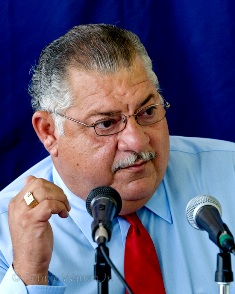 Opposition Leader Kurt Tibbetts announced that he would be stepping down as both leader of the PPM and leader of the opposition, paving the way for a leadership election in the opposition party. It was revealed that all members of the People’s Progressive Movement will be able to cast their vote for the party’s new leader, who will be one of the other four party members in the Legislative Assembly.
Opposition Leader Kurt Tibbetts announced that he would be stepping down as both leader of the PPM and leader of the opposition, paving the way for a leadership election in the opposition party. It was revealed that all members of the People’s Progressive Movement will be able to cast their vote for the party’s new leader, who will be one of the other four party members in the Legislative Assembly.
December:
Cayman breathed another sigh of relief as it escaped the 2010 hurricane season unscathed, but the public continue to face ever more alarming types of crime. Two home invasions of elderly residents, one in which a couple in their 80s was beaten by the robbers, shocked a community that believed it was beyond shock when it came to crime. In a presentation at an international conference the police commissioner pointed the finger at the United States as the source of many Cayman’s crime problems.
On 18 December the seventh road victim of the year was killed by a suspected hit and run driver. Michael Edgington was hit in the early hours of the morning as he tried to cross the West Bay Road.
In the biggest clash yet between politicians and the media, all but four of the country’s legislators voted for the attorney general to prosecute The Caymanian Compass and its reporter, Brent Fuller, as a result of an article and supporting editorial that questioned why lawmakers were discussing a review of the Freedom of Information Law behind closed doors. Although the AG soon announced his decision not to press charges under the Immunities and Privileges Law, the threat to press freedom caused considerable concern in the local public domain as well as on the international stage.
The premier announced his stimulus package on Thursday, 9 December, which fell far short of expectations. A possible moratorium on loan and mortgage payments in the New Year, a possible duty reduction on some unspecified goods by unspecified amounts in the New Year, and more immigration changes, including a five-day permit for investors and staff, were offered as ways to kick start the economy.
 The new auditor general’s first report on the state of the country’s public finances revealed that there was very little improvement in government ministries when it came to keeping proper accounts. While the office found that the statutory authorities had made an effort to abide by the Public Management and Finance Law, the work ministries had done on their books was worthless. He said government had wasted more than $2 million on old useless accounts and had failed to produce up-to-date financial information that would be of any use to the public.
The new auditor general’s first report on the state of the country’s public finances revealed that there was very little improvement in government ministries when it came to keeping proper accounts. While the office found that the statutory authorities had made an effort to abide by the Public Management and Finance Law, the work ministries had done on their books was worthless. He said government had wasted more than $2 million on old useless accounts and had failed to produce up-to-date financial information that would be of any use to the public.
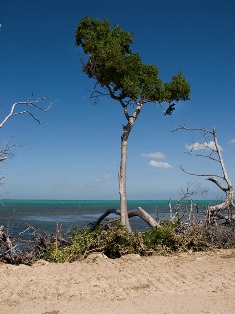 The National Conservation Bill remained one of a number of promised legislative changes that failed to materialize during 2010 and hopes for its enactment faded further when the minister with responsibility for the environment failed to mention the law at all at the opening of a climate change conference. However, hope did appear on the horizon for a possible solution to Mount Trashmore as a US company was selected by government to begin tackling Grand Cayman’s landfill.
The National Conservation Bill remained one of a number of promised legislative changes that failed to materialize during 2010 and hopes for its enactment faded further when the minister with responsibility for the environment failed to mention the law at all at the opening of a climate change conference. However, hope did appear on the horizon for a possible solution to Mount Trashmore as a US company was selected by government to begin tackling Grand Cayman’s landfill.
As the year drew to a close, the prime minister of Qatar popped in and out of Cayman on his luxury mega yacht, the Kittiwake sailed in over the horizon, details of the premier’s travels since he came to office finally came to light in an FOI request granted some six months after it was made, and an armed robbery on 23 December reminded Cayman that crime was still its most pressing problem.